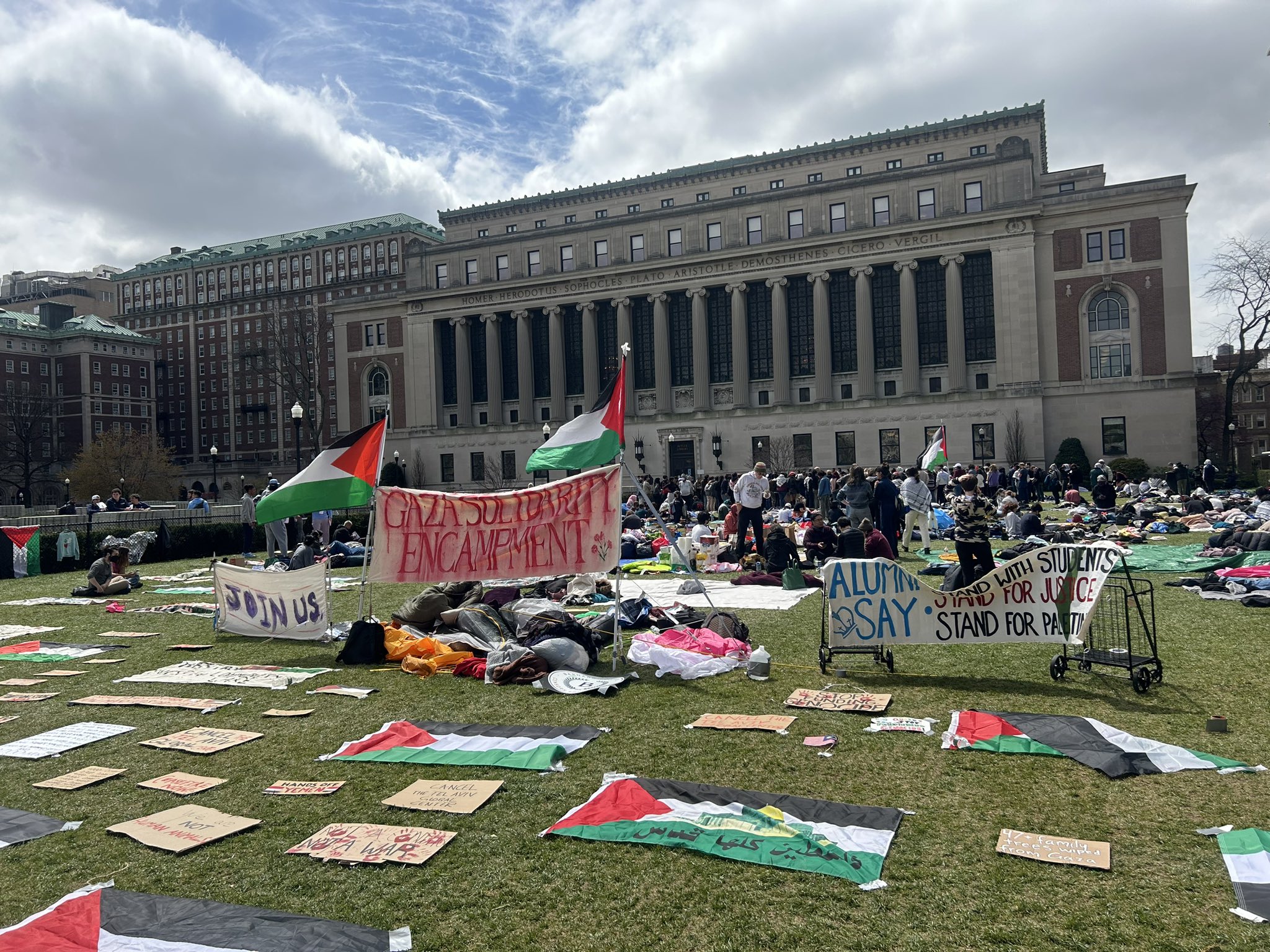Qatar’s ambassador to the US refutes allegations of funding U.S. campus protests against the Gaza war as the student-led movement spreads across American universities.
Sheikh Meshal bin Hamad Al-Thani, Doha’s ambassador to Washington, has vehemently rejected on Sunday media reports that alleged it funded the mass protests at numerous U.S. universities against the ongoing Israeli genocide in Gaza.
In a statement on X, the Qatari official stressed that “it is important to get the facts straight” while rejecting claims that his country is a large donor to American universities.
“The Qatar Foundation pays the costs for six U.S. universities to maintain faculty and operate campuses in Qatar, educating and awarding degrees to women and men from Qatar and others who wish to study there. These are not donations,” he said.
The Qatari diplomat added that Doha “does not influence” the universities it is hosting in Education City.
“We have nothing to do with anything that happens on their home campuses in the U.S.,” he noted.
The U.S. universities in Education City currently include Northwestern University, Texas A&M, Virginia Commonwealth University School of the Arts, Georgetown University, Weill Cornell Medicine, and Carnegie Mellon University.
However, Texas A&M University’s Board of Regents in February decided to close its campus in Doha by the year 2028.
The abrupt decision by Texas A&M even angered Washington, prompting the U.S. ambassador to Qatar Timmy Davis to issue a statement expressing his disappointment in the university’s move.
The university’s board had voted to shut down Texas A&M at Qatar (TAMUQ) over what the Board of Regents Chair, Bill Mahomes, cited as “heightened instability in the Middle East” following an assessment of the regional situation in late 2023.
An earlier report by the Texas Tribune said that the decision came after Washington, DC think tank, the Institute for the Study of Global Antisemitism and Policy (ISGAP), questioned the partnership between QF and Texas A&M in light of the ongoing war in Gaza.
The board of ISGAP has numerous staunch Israel supporters and those who repeatedly published baseless accusations over Qatar.
This includes Sima Vaknin Gill, who is the Vice President of Strategy and Development at the think tank. Gill is a former intelligence officer in the Israeli Air Force for more than 20 years as well as the Chief Censor of Israel.
The board also includes Gregg M. Mashberg, one of ISGAP’s advisors, who called for boycotting Qatar.
“Perhaps the campus social justice warriors (students and faculty) taking aim at Israel might want to inquire how much $ their institutions are taking in from Qatar. If they need a country to boycott, look no further,” Mashberg said in a post on X on June 10, 2023.
Another factor of the TAMUQ closure circles back to Texas Governor Greg Abbott, a staunch supporter of Israel.
Abbott even travelled to Israel last November to offer Texas’s support for the war against Palestinians in Gaza, where more than 70 percent of those killed are women and children.
In 2020, Abott received the Friends of Zion award during a visit to Jerusalem.
“There are strong relations between Texas and Israel. Anybody who is an enemy of Israel is an enemy of Texas,” Abbott said during the ceremony at the time.
The TAMUQ case is part of wider examples of criticism and a misinformation campaign directed at Qatar since it assumed a crucial mediation role between Israel and Hamas.
This is despite Qatar’s role, alongside Egypt, that resulted in a truce deal that lasted between November 24 and December 1. The truce led to the release of at least 109 captives from Hamas in Gaza.
Despite Qatar’s past and ongoing crucial mediation efforts, it has been on the receiving end of criticism by Israeli officials, including Prime Minister Benjamin Netanyahu, and American diplomats.
An unprecedented movement
For the past couple of weeks, the U.S., Europe and Australia have been witnessing an unprecedented student-led movement against their universities’ active backing of Israel in light of the genocide in Gaza.
A key demand has been for the universities to divest from companies linked to Israel and press for a ceasefire in Gaza, where occupation forces killed more than 34,000 people.
The protests and encampments have been expanding from Columbia University in New York to Northwestern University in Illinois.
Police across the U.S. responded to the protests by arresting hundreds across the campuses, though the exact figure remains unclear as the protests continue. Footage online also showed the police beating up the protestors, including students and professors.
Those involved in the protests put their safety and academic life at risk to advocate for justice for Gaza’s 2.2 million population. The protests also came as countries, including the U.S., failed to pressure Israel to halt the war.
Such attacks on academia in an effort to stifle voices speaking against the genocide in Gaza emerged late last year.
Last December, presidents of Harvard University, the University of Pennsylvania, and the Massachusetts Institute of Technology were questioned by Congress over their campuses’ alleged antisemitic stances.
The hearing focused on chants by students on campuses such as “from the river to the sea” and “Intifada,” which Republican Congresswoman Elise Stefanik described as calls for the genocide of Jews.
Intifada is an Arabic term for “uprising” against the occupation of Palestine.
The crackdown on pro-Palestine speeches at campuses took place in various forms, such as suspending activist groups like Students for Justice in Palestine (SJP).
Institutes like Rutgers University, George Washington University, Columbia University, and Brandeis University took disciplinary action against SJP.
Even Jewish groups, such as the Jewish Voice for Peace, have been accused of antisemitism for their criticism of the killing of Palestinian civilians in Gaza.







